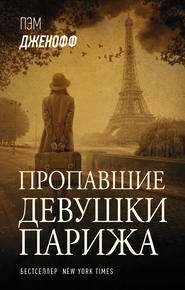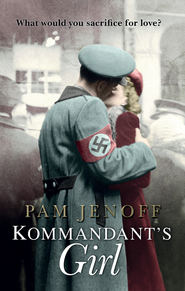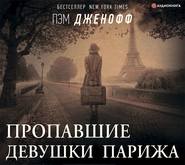По всем вопросам обращайтесь на: info@litportal.ru
(©) 2003-2024.
✖
The Lost Girls Of Paris
Автор
Год написания книги
2019
Настройки чтения
Размер шрифта
Высота строк
Поля
Taking in the shattered windshield of the Studebaker, Grace suddenly felt sick. “Such a shame,” she managed finally.
“I didn’t see it,” the man replied. “But someone said she was killed instantly. At least she didn’t suffer.”
At least. That was the phrase Grace heard too often after Tom had died. At least she was still young. At least there had not been children—as if that made it somehow easier to bear. (Children, she sometimes thought, would not have been a burden, but a bit of him left behind forever.)
“You just never know where it will all end,” mused the flat-capped man beside her. Grace did not answer. Tom’s death had been unexpected, too, an overturned jeep on the way from the army base to the train station in Georgia, headed to New York to see her before he’d deployed. They called him a casualty of war, but in fact it had been just another accident that might have happened anywhere.
A flashbulb from a reporter’s camera popped, causing her to blink. Grace shielded her eyes then backed away blindly through the crowd that had formed, seeking air amid the cigarette smoke and sweat and perfume.
Away from the police barricade now, Grace looked over her shoulder. Forty-Third Street was blocked to the west as well, preventing her from cutting across. To go back up Madison and around the other side of the station would take at least another half an hour, making her even later for work than she already was. Again, she cursed the night before. If it weren’t for Mark, she wouldn’t be standing here, faced with no other choice than to cut through Grand Central—the one place she had sworn to never go again.
Grace turned to face it. Grand Central loomed before her, its massive shadow darkening the pavement below. Commuters streamed endlessly through its doors. She imagined the inside of the station, the concourse where the light slatted in through the stained glass windows, the big clock where friends and lovers met. It was not the place she couldn’t bear to see, but the people. The girls with their fresh red lipstick, pressing tongues against teeth to make sure the color hadn’t bled through, clutching purses expectantly. Freshly washed children looking just a bit nervous at seeing a father who they could not remember because he had left when they were scarcely toddlers. The soldiers in uniforms rumpled from travel bounding onto the platform with wilted daisies in hand. The reunion that would never be hers.
She should just give up and go home. Grace longed for a nice bath, perhaps a nap. But she had to get to work. Frankie had interviews with a French family at ten and needed her to take dictation. And after that the Rosenbergs were coming, seeking papers for housing. Normally this was what she loved about the work, losing herself in other peoples’ problems. But today the responsibility weighed down heavy upon her.
No, she had to go forward and there was only one choice. Squaring her shoulders, Grace started toward Grand Central.
She walked through the station door. It was the first time she had been here since that afternoon she’d arrived from Connecticut in her best shirred dress, hair perfectly coiffed in victory rolls and topped with her pillbox hat. Tom hadn’t arrived on the three from Philadelphia, where he should have changed trains, as expected and she assumed he had missed his connection. When he didn’t get off the next train either, she became a bit uneasy. She checked the message board beside the information booth at the center of the station, where people pinned notes in case Tom had come early or she had somehow missed him. She had no way to reach him or check and there was nothing to do but wait. She ate a hot dog that smudged her lipstick and turned sour in her mouth, read the newspaper headlines at the kiosk a second, then a third time. Trains came and emptied, spilling onto the platform soldiers who might have been Tom but weren’t. By the time the last train of the night arrived at eight thirty, she was frantic with worry. Tom never would have left her standing like this. What had happened? Finally, an auburn-haired lieutenant she’d recognized from Tom’s induction ceremony came toward her with an expression of dread and she’d known. She could still feel his unfamiliar hands catching her as her knees buckled.
The station looked the same now as it had that night, a businesslike, never-ending stream of commuters and travelers, undisturbed by the role it had played so large in her mind these many months. Just get across, she told herself, the wide exit at the far side of the station calling to her like a beacon. She didn’t have to stop and remember.
Something pulled at her leg strangely, like the tearing of a small child’s fingers. Grace stopped and looked behind her. It was only a run in her nylons. Had Mark’s hands made it? The tear was growing larger with every step now, an almost gash across her calf. She was seized with the need to get them off.
Grace raced for the stairs to the public washroom on the lower level. As she passed a bench, she stumbled, nearly falling. Her foot twisted, causing a wave of pain to shoot through her ankle. She limped to the bench and lifted her foot, assuming that the heel that she had not had fixed properly had come off again. But the shoe was still intact. No, there was something jutting out from beneath the bench she had just passed that had caused her to trip. A brown suitcase, shoved haphazardly beneath. She looked around with annoyance, wondering who could have been so irresponsible as to leave it like that, but there was no one close and the other people passed by without taking notice. Perhaps whoever owned it had gone to the restroom or to buy a newspaper. She pushed it farther underneath the bench so that no one else would trip on it and kept walking.
Outside the door to the ladies’ room, Grace noticed a man sitting on the ground in a tattered uniform. For a fleeting second, she was glad Tom had not lived to fight and return destroyed from what he had seen. She would always have the golden image of him, perfect and strong. He would not come home scarred like so many she saw now, struggling to put a brave face over the brokenness. Grace reached in her pocket for the last of her coins, trying not to think about the coffee she so dearly wanted that she would now have to do without. She pressed the money into the man’s cracked palm. She simply couldn’t look away.
Grace continued into the ladies’ room, locking herself in a stall to remove her nylons. Then she walked to the mirror to smooth her ink-black hair and reapply her Coty lipstick, tasting in its waxiness all that had happened the night before. At the next sink, a woman younger than herself smoothed her coat over her rounded belly. Pregnancies were everywhere now, it seemed, the fruits of so many joyous reunions with the boys who came home from the war. Grace could feel the woman looking at her disheveled appearance. Knowing.
Mindful that she was even later now for work, Grace hurried from the restroom. As she started across the station once more, she noticed the suitcase she had nearly tripped over moments earlier. It was still sitting under the bench. Slowing, she walked to the suitcase, looking around for someone coming to claim it.
When no one did, Grace knelt to examine the suitcase. There was nothing terribly extraordinary about it, rounded like a thousand other valises that travelers carried through the station every day, with a worn mother-of-pearl handle that was nicer than most. Only this one wasn’t passing through; it was sitting under a bench unattended. Abandoned. Had someone lost it? She stopped with a moment’s caution, remembering a story from during the war about a bag that was actually a bomb. But that was all over, the danger of invasion or other attack that had once seemed to lurk around every corner now faded.
Grace studied the case for some sign of ownership. There was a name chalked onto the side. She recalled uneasily some of Frankie’s clients, survivors whom the Germans had forced to write their names on their suitcases in a false promise that they would be reunited with their belongings. This one bore a single word: Trigg.
Grace considered her options: tell a porter, or simply walk away. She was late for work. But curiosity nagged at her. Perhaps there was a tag inside. She toyed with the clasp. It popped open in her fingers seemingly of its own accord. She found herself lifting the lid a few inches. She glanced over her shoulder, feeling as though at any minute she might get caught. Then she looked inside the suitcase. It was neatly packed, with a silver-backed hairbrush and an unwrapped bar of Yardley’s lavender soap tucked in a top corner, women’s clothes folded with perfect creases. There was a pair of baby shoes tucked in the rear of the case, but no other sign of children’s clothing.
Suddenly, being in the suitcase felt like an unforgivable invasion of privacy (which, of course, it was). Grace pulled back her hand quickly. As she did, something sliced into her index finger. “Ouch!” she cried aloud, in spite of herself. A line of blood an inch or more long, already widening with red bubbles, appeared. She put her finger to her mouth, sucking on the wound to stop the bleeding. Then she reached for the case with her good hand, needing to know what had cut her, a razor or knife. Below the clothes was an envelope, maybe a quarter inch thick. The sharp edge of the paper had cut her hand. Leave it, a voice inside her seemed to say. But unable to stop herself, she opened the envelope.
Inside lay a pack of photographs, wrapped carefully in a piece of lace. Grace pulled them out, and as she did a drop of blood seeped from her finger onto the lace, irreparably staining it. There were about a dozen photos in all, each a portrait of a single young woman. They looked too different to be related to one another. Some wore military uniforms, others crisply pressed blouses or blazers. Not one among them could have been older than twenty-five.
Holding the photos of these strangers felt too intimate, wrong. Grace wanted to put them away, forget what she had seen. But the eyes of the girl in the top photo were dark and beckoning. Who was she?
Just then there were sirens outside the station and it felt as though they might be meant for her, the police coming to arrest her for opening someone else’s bag. Hurriedly, Grace struggled to rewrap the photos in the lace and put the whole thing back into the suitcase. But the lace bunched and she could not get the packet back into the envelope. The sirens were getting louder now. There was no time. Furtively, she tucked the photos into her own satchel and she pushed the suitcase back under the bench with her foot, well out of sight.
Then she started for the exit, the wound on her finger throbbing. “I should have known,” she muttered to herself, “that no good could ever come from going into the station.”
Chapter Two (#ud32e4584-82b1-54e6-9cbe-6d0b6a5f37b3)
Eleanor
London, 1943
The Director was furious.
He slammed his paw-like hand down on the long conference table so hard the teacups rattled and tea sloshed over the rims all the way at the far end. The normal banter and chatter of the morning meeting went silent. His face reddened.
“Another two agents captured,” he bellowed, not bothering to lower his voice. One of the typists passing in the corridor stopped, taking in the scene with wide eyes before scurrying on. Eleanor stood hurriedly to close the door, swatting at the cloud of cigarette smoke that had formed above them.
“Yes, sir,” Captain Michaels, the Royal Air Force attaché, stammered. “The agents dropped near Marseille were arrested, just hours after arrival. There’s been no word and we’re presuming they’ve been killed.”
“Which ones?” the Director demanded. Gregory Winslow, Director of Special Operations Executive, was a former army colonel, highly decorated in the Great War. Though close to sixty, he remained an imposing figure, known only as “the Director” to everyone at headquarters.
Captain Michaels looked flummoxed by the question. To the men who ran the operation from afar, the agents in the field were nameless chess pieces.
But not to Eleanor, who was seated beside him. “James, Harry. Canadian by birth and a graduate of Magdalen College, Oxford. Peterson, Ewan, former Royal Air Force.” She knew the details of every man they’d dropped into the field by heart.
“That makes the second set of arrests this month.” The Director chewed on the end of his pipe without bothering to light it.
“The third,” Eleanor corrected softly, not wanting to enrage him further but unwilling to lie. It had been almost three years since Churchill had authorized the creation of Special Operations Executive, or SOE, and charged it with the order to “set Europe ablaze” through sabotage and subversion. Since then, they had deployed close to three hundred agents into Europe to disrupt munitions factories and rail lines. The majority had gone into France as part of the unit called “F Section” to weaken the infrastructure and arm the French partisans ahead of the long-rumored cross-Channel Allied invasion.
But beyond the walls of its Baker Street headquarters, SOE was hardly regarded as a shining success. MI6 and some of the other traditional government agencies resented SOE’s sabotage, which they saw as amateurish and damaging to their own, more clandestine, operations. The success of SOE efforts were also hard to quantify, either because they were classified or because their effect would not be fully felt until the invasion. And lately things had started to go wrong, their agents arrested in increasing number. Was it the size of the operations that was the problem, making them victims of their own success? Or was it something else entirely?
The Director turned to Eleanor, newfound prey that had suddenly caught the lion’s attention. “What the hell is happening, Trigg? Are they ill prepared? Making mistakes?”
Eleanor was surprised. She had come to SOE as a secretary shortly after the organization was created. Getting hired had been an uphill battle: she was not just a woman, but a Polish national—and a Jew. Few thought she belonged here. Oftentimes she wondered herself how she’d come from her small village near Pinsk to the halls of power in London. But she’d persuaded the Director to give her a chance, and through her skill and knowledge, meticulous attention to detail and encyclopedic memory, she had gained his trust. Even though her title and pay had remained the same, she was now much more of an advisor. The Director insisted that she sit not with the other secretaries along the periphery, but at the conference table immediately to his right. (He did this in part, she suspected, to compensate for his deafness in his ear on that side, which he admitted to no one else. She always debriefed him in private just after the meeting to make certain he had not missed anything.)
This was the first time, though, that the Director had asked for her opinion in front of the others. “Respectfully, sir, it isn’t the training, or the execution.” Eleanor was suddenly aware of every eye on her. She prided herself on lying low in the agency, drawing as little attention as possible. But now her cover, so to speak, had been blown, and the men were watching her with an unmasked skepticism.
“Then what is it?” the Director asked, his usual lack of patience worn even thinner.
“It’s that they are men.” Eleanor chose her words carefully, not letting him rush her, wanting to make him understand in a way that would not cause offense. “Most of the young Frenchmen are gone from the cities or towns. Conscripted to the LVF, off fighting for the Vichy collaborationist militia or imprisoned for refusing to do so. It’s impossible for our agents to fit in now.”
“So what then? Should we send them all to ground?”
Eleanor shook her head. The agents could not go into hiding. They needed to be able to interact with the locals in order to get information. It was the waitress in Lautrec overhearing the officers chatter after too much wine, the farmer’s wife noticing changes in the trains that passed by the fields, the observations of everyday citizens that yielded the real information. And the agents needed to be making contacts with the reseau, the local networks of resistance, in order to fortify their efforts to subvert the Germans. No, the agents of the F Section could not operate by hiding in the cellars and caves.
“Then what?” the Director pressed.
“There’s another option...” She faltered and he looked at her impatiently. Eleanor was not one to be at a loss for words, but what she was about to say was so audacious she hardly dared. She took a deep breath. “Send women.”
“Women? I don’t understand.”
The idea had come to her weeks earlier as she watched one of the girls in the radio room decode a message that had come through from a field agent in France with a swift and sure hand. Her talents were wasted, Eleanor thought. The girl should be transmitting from the field. The idea had been so foreign that it had taken time to crystalize in Eleanor’s own mind. She had not meant to bring it up now, or maybe ever, but it had come out nonetheless, a half-formed thing.
“Yes.” Eleanor had heard stories of women agents, rogue operatives working on their own in the east, carrying messages and helping POWs to escape. Such things had happened in the First World War as well, probably to a greater extent than most people imagined. But to create a formal program to actually train and deploy women was something altogether different.
“But what would they do?” the Director asked.














